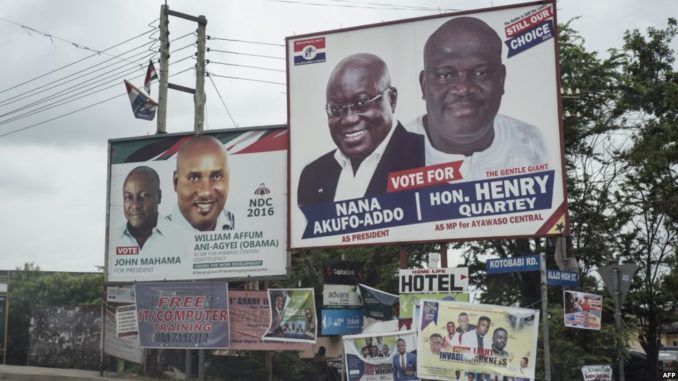
WASHINGTON —
The Electoral Commission of Ghana has begun approving local and international poll observer groups to monitor the December 7 presidential and legislative elections. The electoral commission, however, says groups affiliated with political parties would not be allowed to monitor the polls.
The criteria that poll observer groups must meet before their applications are considered include the name of the poll monitoring group, the leadership and composition of the group and their experience in election observation together with their passport pictures as well as their contact information.
“We have received a number of applications to observe the elections in the country,” said Eric Dzakpasu, spokesman for the electoral commission. The commission has also received a number of applications from local and international observers, as well as foreign missions and embassies, he added.
Thousands of monitors
“As at the meeting we had today with the political parties, tentatively, we are talking about 400 international observers,” he said. Embassies and foreign missions have about 200 observers. CFI France, which provides assistance to the media, has about 1,000 observers, and there are about 10,000 local observers.
“Once the accreditation is granted, they can go anywhere, but they need to inform the commission where they would be concentrated and where the rest of the [observers] would be dispersed throughout the country. And once accredited, they do have access to all parts of the country, while the election is going on,” Dzakpasu added.
Officials of the electoral commission also met Friday representatives of the political parties at the Inter-Party Advisory Committee in the capital, Accra. The objective of the meeting, the electoral officials said, was to help resolve the political groups’ concerns as part of the electoral body’s effort to ensure a transparent process.
The electoral commission will administer special voting December 1. On that day, security officials, electoral commission officials and journalists who will be on duty on election day are scheduled to vote.
Special voting concerns
Some political parties are accusing the electoral commission of doing the bidding of the ruling party to rig the special voting — a charge the electoral commission sharply denies.
Opposition parties previously expressed concern about the voter list compiled by the commission to be used for the elections. They said it appeared the electoral body was overly slow compiling the list.
The parties also raised concern about the number of people who are registered to participate in the special voting December 1. The parties also wanted to know the number of voting centers that would be used for the special voting.
“The major concern centered around the voters register, the proxy list and then the special voting list,” Dzakpasu said, “and they also wanted to know the state of preparation of the electoral commission.
The parties “were also interested in the election observation and then the process for the transmission of election results electronically from the various constituency centers to the national coalition center,” he added, “and most importantly, they were also concerned about the modalities for the training of party agents.” All of the issues were addressed at the meeting.
The number of people who were supposed to vote early has been of some contention, Dzakpasu said. “I think we have finalized the list of special voters and the figure is out and the political parties are now comfortable with the final figure,” he added.
“The special voting list has about 127,394 people, and they would be voting on the first of December at about 284 polling stations, which are based in all the 275 constituencies of the country,” he added.
VOA
